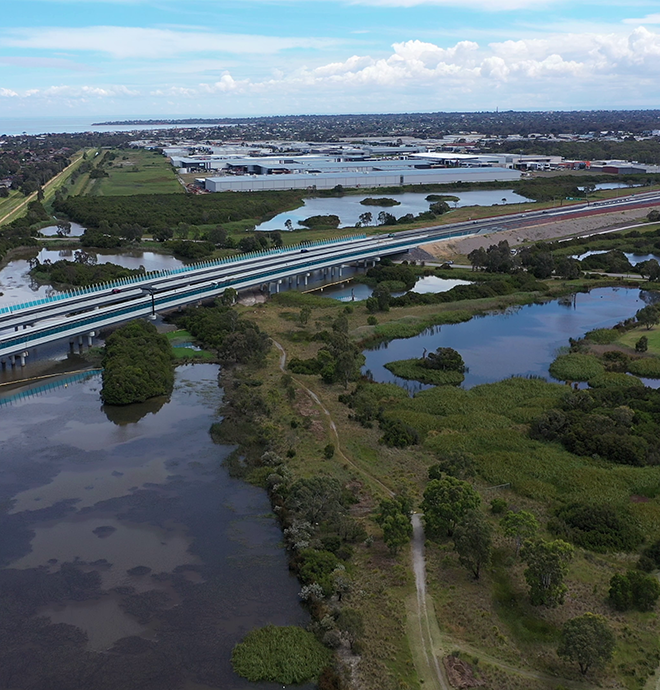
Local primary school benefits from road upgrade in Australia
Our team on the Major Road Project Victoria’s (MRPV) Narre Warren-Cranbourne Road Upgrade project worked alongside Cranbourne Primary School students to spread 15 cubic metres of mulch, refreshing garden beds across the school grounds.
The gum mulch was donated to the school by the project, following tree removal works along the route.
The working bee consisted of 10 student leaders interested in the environment and a team of construction staff.
School Principal Lachlan Yeates said the activity offered a great learning experience for his students.
"We're excited to be working with MRPV and McConnell Dowell to help support student leaders in becoming more environmentally aware," Mr Yeates said.
"We greatly appreciate the time and resources volunteered by the project team to beautify the school grounds."
The donation and working bee is another example of our project teams working with the community and our customer to improve environmental outcomes through reusing, recycling and re-purposing.
Linked barges to minimise environmental impact – Tasmania
Our marine engineering specialists are always on the lookout for ways to minimise the impact of our work on sensitive environments, and a recent success comes from the New Bridgewater Bridge Project in Tasmania.
The project involves a new 1 300 m long bridge built across the River Derwent. The bridge will be erected from a temporary access platform, which crosses shallow tidal mudflats that have significant environmental, cultural and heritage importance. The temporary access platform allows continuous access for delivery and lifting of segments along the bridge alignment.
The initial design for the temporary access platform included piles, but this approach was deemed to have significant environmental, cost and programme impacts.
So an alternate and innovative construction methodology was developed by our marine specialists.
While the shallow tidal mudflats prevented the use of floating crane barges, interconnected barges placed on the seabed form the basis of the solution.
Standard (flat-top, 55 m long) barges will be floated into position at high tide, trimmed and ballasted down onto the mud flats. The barges will be connected using specifically designed link bridges, allowing movement of equipment over a total length of about 800 m.
The innovative design caters for critical issues such as differential settlement of the very soft muds under cyclic loads; dynamic lifting loads; and load sharing between barges. Specific lift plans have been developed to address key risks during erection.
The linked barges design provides a safe and cost-effective solution while minimising the impact of construction activities on the environmentally sensitive mudflats. After the barges have been removed the mudflats are expected to recover completely. The barges and link bridges can also be re-used on other marine projects, unlike the original piled solution.


Awarded for excellence in environmental outcomes – Australia
Our Mordialloc Freeway Project (MFP) won the Excellence in Environmental Outcomes Award at the Infrastructure Sustainability Council Gala Awards 2021. The awards celebrates sustainability best practices across Australia and New Zealand.
Infrastructure Sustainability Council (ISC) is the peak body for infrastructure sustainability, advocating for the delivery of cultural, social, economic and environmental benefits in all infrastructure projects.
The MFP is a 9 km freeway link in Victoria, incorporating interchanges, bridges over wetlands and a shared user path. The project implemented a range of world-first sustainability initiatives in response to Victoria’s waste crisis and shortage of quarry materials, creating 'Australia's greenest freeway'.
Thousands of tonnes of otherwise waste material were used to construct noise walls, asphalt pavements, concrete reinforcing mesh and stormwater drainage pipes. This shift to sustainable consumption of materials achieved a 27% reduction in embodied energy.
The judges acknowledged the significant effort in innovating new technologies to divert waste away from landfill, saying...
"The focus on reduced truck trips, local sourcing and recycling is a powerful way to improve industry practices.
"The MFP demonstrates the potential cost benefits of improvised sustainability practices while supporting development and scale-up of local industry."
